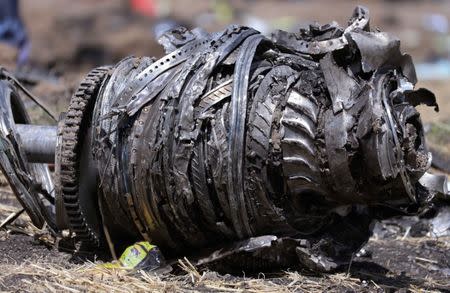Explainer: The global safety rules behind Ethiopia jet crash probe

MONTREAL (Reuters) - A keenly awaited preliminary report on a March 10 Ethiopian Airlines crash that killed 157 people, triggering the global grounding of Boeing's 737 MAX, is due within days.
Here are some facts about the process:
WHEN ARE REPORTS DUE?
Under rules overseen by the United Nations' Montreal-based aviation agency, ICAO, Ethiopia must issue a preliminary report within 30 days of the disaster, meaning the deadline is April 9.
It should also publish a final report within 12 months of the crash.
WHAT IS 'ANNEX 13'?
The rules governing aircraft accident investigations are known throughout the industry by their legal name "Annex 13".
Drawing their name from an annex to the Convention on International Civil Aviation - commonly known as the 1944 Chicago Convention - they represent a low-key but effective form of international co-operation that has rarely been challenged.
By promoting unusually close technical co-operation across political frontiers and steering clear of issues of blame, Annex 13 has been credited with improving air safety dramatically since it was first introduced, safety officials say.
The purpose of its investigations is to understand the cause of a crash or incident requiring major aircraft repair and make recommendations to prevent a repeat in the future. But participants acknowledge national sensitivities or disputes over control of data can slow or disrupt high-profile probes.
The disappearance of Malaysian flight MH370 and the shooting down of MH17 over Ukraine both tested the willingness of nations to share data, safety officials say. Participating countries can express disagreements over the contents of a final report.
WHO CAN PARTICIPATE?
Under Annex 13, the country where an air accident takes place, in this case Ethiopia, is responsible for the investigation but can delegate it to another country.
Countries where the aircraft is registered, operated and manufactured are entitled to appoint accredited representatives.
A country which had citizens die in the crash can appoint an expert to visit the scene of the accident, receive updates on the event and the final accident investigation report.
ICAO does not participate in accident investigations unless it receives a special request from the country in charge. It is not participating in investigations on Ethiopian Airlines and a separate Lion Air crash last October involving the 737 MAX.
WHAT IS ICAO?
The International Civil Aviation Organization is a United Nations agency celebrating its 75th anniversary this year.
It cannot impose binding rules on governments, but wields clout through its safety and security standards which are approved by its 192 member countries.
It was founded by the 1944 Chicago Convention, a gathering of 52 countries which agreed to common rules for the burgeoning civil aviation industry anticipated after World War Two.
(Reporting by Allison Lampert and Tim Hepher; Editing by Mark Potter)

